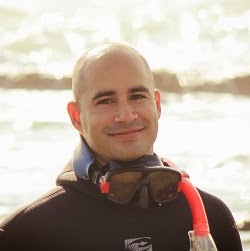
Full Name: Phanor Montoya-Maya
Age: 37 years
Live In: Colombian living in South Africa since 2006
Working For: Self-employed
Diver Qualifications: SSI Divemaster Instructor, Class V Commercial Diver
When and where did you start diving?
I started diving in 1993. I did my first NAUI Scuba Diver course in Cali (Colombia) and went for my certification trip to Gorgona Island in the Colombian Pacific Ocean.
Why did you start diving?
I honestly don’t know! One day I decided I will give it a try and I just did. Haven’t stopped diving ever since.
What made you choose to become a dive professional?
I had some much fun diving with my friends that I kept inviting all of them to my dives. However, not all of them were divers. I figured that the only way to get them to join me was if I train them personally. I then became Divemaster so I could take my friends for short underwater journeys. While doing so, I found that I really enjoyed seeing their transition, from complete fear to total enjoyment. This was my first motivation to become a dive professional.
Which is your favourite dive site and why?
This is a tough one. Each dive site is different from the next; furthermore, two dives in the same dive site will never be the same. If I had to choose, Providence Island in the Colombian Caribbean might top of the list.
What has been the most memorable dive of your life and why?
Many memorable dives in my life. However, there is one in particular that brings joy to me. In 2004, my wife and I organized a volunteer-based dive expedition to document for the first time coral spawning at Tayrona Park in the Colombian Caribbean. We trained the volunteer divers on how to recognize coral spawning as described in the literature. Our knowledge of coral spawning came from books and stories so we didn’t know what to expect. We arrived at the chosen location around 6:30pm, we jumped in the water to check the area and select coral colonies to monitor for spawning. Based on the literature, spawning was expected to happen later that night. To our surprise, corals were already spawning when we jumped in the water. Egg-and-sperm bundles were coming out of brain and star corals all over the reef; it was like if it was snowing up-side down. Fish, brittle stars, fire worms and many more organisms were as active as never seen before; eating the bundles as they were being expelled. Bigger animals were taking advantage, feeding on the small ones as the latter were focused on catching as many bundles as possible. Excited from seen this, we forgot about any scientific protocols and we just asked the divers to quickly jump in the water and enjoy this spectacle. We were in the water for over an hour, only to be chased out by our limited air supply. We came out of the dive amazed and full of joy for having seen this natural phenomena. I am still chasing my net coral spawning dive!
If you would come back as a marine life form in your next life, what would that be?
A Spanish Dancer!
Who is your dream dive buddy?
Aquaman? Kidding, it would have to be my mother. I would love to get her diving with me!
What dive locations are on your dream “bucket list” and why?
Malpelo Island (Colombian Pacific), probably the only dive spot from Colombia that I haven’t dived yet. Great barrier reef, preferably during coral spawning time. A deep water reef, any deep water reef; I just find life in the depth so interesting.
What is on your bedside table right now?
Two GoPro Hero 3 Black Edition; just checking the footage from my previous dives.
What is your favourite piece of diving equipment and why?
The mask! I don’t know why but I like to collect masks. Once, I ended up having over 10 different masks. Some I used for pool sessions only, some I used only for free diving while others I will only use for SCUBA. I guess it was some kind of fetishism.
If you were to launch a campaign to raise awareness on a specific issue that affects divers, the oceans or marine life, what issue would you target and why?
Divers and dive professional need to get more active on ocean conservation. For divers, the ocean is our playground; for dive professionals, the ocean is our business centre. If we don’t make our dives count; if we don’t translate our dives into meaningful dives, we won’t have a place to dive in the near future. It is not only our responsibility, it is to our benefit to get actively involved in ocean conservation.
Where will you be in 10 years and what will you be doing?
I will be travelling the world, conducting meaningful dives and ensuring divers make their dives count for ocean conservation.






